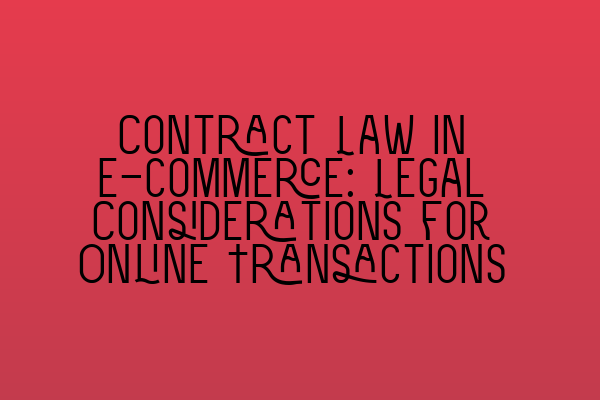Contract Law in E-commerce: Legal Considerations for Online Transactions
In today’s digital age, e-commerce has become a crucial aspect of business. With the rise of online platforms and marketplaces, businesses can now reach customers on a global scale. However, with these opportunities come legal responsibilities. As a solicitor specializing in contract law, I understand the importance of ensuring that e-commerce transactions are legally sound and protect the rights of all parties involved. In this article, we will explore the legal considerations and best practices for online transactions in the realm of contract law.
One of the key elements of any contract is offer and acceptance. In e-commerce, this can be a bit more complex compared to traditional brick-and-mortar transactions. Online businesses must clearly communicate their offers to potential customers through their websites, online advertisements, or email marketing campaigns. A clear and specific description of the product or service being offered, along with its price, should be provided. To solidify the offer, businesses may include an “Add to Cart” or “Buy Now” button on their website, allowing customers to signal their acceptance.
It is essential to ensure that the acceptance of an offer is valid. Sometimes, customers may attempt to negotiate the terms of the contract by including additional conditions or altering the terms set by the business. As a solicitor, I advise my clients to carefully review and consider any counteroffers from customers. When accepting these counteroffers, it is crucial to do so explicitly and communicate the acceptance back to the customer in writing, such as through an email confirmation or an electronic contract.
To further protect online businesses, it is advisable to have clear and comprehensive terms and conditions that govern the contractual relationship between the business and its customers. These terms and conditions should cover important aspects such as payment, delivery, returns, warranties, and limitations of liability. By having these terms readily available on their websites, businesses can ensure that customers are aware of and agree to them before entering into a transaction. It is essential to have customers explicitly agree to these terms by requiring them to check a box or click a button before completing their purchase.
Another crucial consideration in e-commerce is data protection and privacy. As more businesses collect and store customer information, it is critical to comply with data protection laws and regulations. This includes obtaining consent from customers to collect and use their personal information, as well as implementing appropriate security measures to protect that data from unauthorized access or disclosure. Failure to take these precautions can result in severe legal consequences and damage to a business’s reputation.
In addition to protecting customers, businesses must also protect themselves from fraudulent activities and disputes. Implementing robust verification processes, such as address verification systems or two-factor authentication, can help verify the identity of customers and reduce the risk of fraud. Furthermore, having a clear dispute resolution process in place can help resolve conflicts in a fair and efficient manner, without resorting to costly and time-consuming legal proceedings.
It is important to note that online transactions are not limited to business-to-consumer relationships. Many businesses engage in e-commerce transactions with other businesses, known as business-to-business (B2B) transactions. In B2B e-commerce, contracts can be more complex, often involving negotiations, customization, and long-term agreements. As a solicitor, I encourage businesses to seek legal advice and assistance when engaging in B2B e-commerce to ensure that their rights and interests are adequately protected.
In conclusion, contract law has a vital role in e-commerce, ensuring that online transactions are legally binding and protect the rights of all parties involved. By following best practices, such as clearly communicating offers and acceptance, implementing comprehensive terms and conditions, protecting data privacy, and having effective dispute resolution processes, businesses can navigate the legal complexities of e-commerce successfully. As a solicitor specializing in contract law, I am here to assist businesses in understanding and complying with the legal considerations of e-commerce transactions.
If you found this article informative, you may be interested in reading these related articles:
– Unveiling Real-Life Case Studies: Insights into Legal Practice and Decision-Making
– Exploring Solicitor Salaries in the UK: Average Earnings and Factors Affecting Income
– Mastering Client Relationship Management: Skills for Solicitors to Enhance Trust and Loyalty
– Pursuing a Law School Education in the UK: Choosing the Right Path for Your Future
– Securing Training Contracts: A Roadmap to Becoming a Solicitor
Feel free to reach out to me at SQE Contract Law for any legal advice or assistance with contract law matters in e-commerce transactions.
